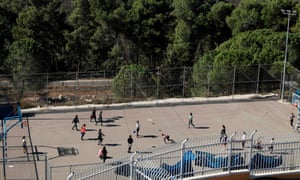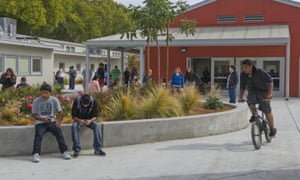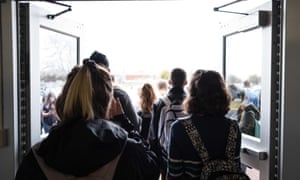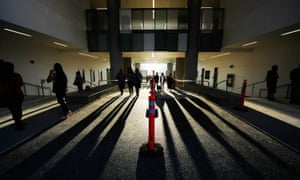For Ingrid, a 15-year-old in La Crosse, Wisconsin, going to high school means being monitored on surveillance cameras in her hallways and classrooms. Students are required to carry their school supplies in clear backpacks, as ordinary backpacks might be used to conceal a weapon, she said. Water bottles must also be clear, so school officials can see the color of the liquid inside. The monitoring continues on the laptops students use in school. Teenagers are warned that the school is tracking what they do, and that they can get in trouble for visiting inappropriate websites.
This level of surveillance is “not too over-the-top”, Ingrid said, and she feels her classmates are generally “accepting” of it.
When it comes to digital surveillance of what they do on school laptops, “I feel like everyone’s adjusted. I don’t think anyone really cares at this point,” Ingrid said. “The subject doesn’t really come up until someone’s gotten in trouble for something. Usually it’s just like, ‘Oh, that person is stupid, looking at what they were doing on a school device. They should have known better.’”
If the school were monitoring anything on her personal cellphone, that would be a privacy violation, Ingrid said. But on her school-issued laptop? “I have no problem with it, because it’s a school device, you know?”
For decades, American school shootings have driven a booming school security industry. Last year’s school shooting in Parkland, Florida, which left 17 people dead, has helped expand the market for products that allow schools to monitor what students are doing on their computers for signs of violence or self-harm. Tech companies are now offering a range of products that help schools track the websites kids are visiting and the searches they are making; that monitor everything students are writing in school emails, chats and shared documents; or that even attempt to track what students are posting on their public social media accounts.

One leading student privacy expert estimated that as many as a third of America’s roughly 15,000 school districts may already be using technology that monitors students’ emails and documents for phrases that might flag suicidal thoughts, plans for a school shooting, or a range of other offenses.
In interviews, students and parents across the United States said they were still grappling with how this new school surveillance works, whether it goes too far in violating student privacy, and what effect it might have on a generation of children.
Dozens of parents, students and educators responded to a Guardian callout asking for perspectives on public schools’ adoption of new digital surveillance technology. The Guardian is quoting children by their first names only, and contacted each of the children’s parents to confirm how they would be identified in print.
Some parents said they were alarmed and frightened by schools’ new monitoring technologies. Others said they were conflicted, seeing some benefits to schools watching over what kids are doing online, but uncertain if their schools were striking the right balance with privacy concerns. Many said they were not even sure what kind of surveillance technology their schools might be using, and that the permission slips they had signed when their kids brought home school devices had told them almost nothing.
Some believe students are already fully adjusted to the experience of intensive school surveillance.
“They’re resigned to it,” said Jarrett Dapier, 40, a parent of a middle school student, and a young adult librarian in Skokie, Illinois. “They all know – at least the ones I’ve talked to – that this is going on. It’s sort of like: this is the cost of getting a school device.
“It’s pretty disturbing,” he said.
When Dapier talks with other teen librarians about the issue of school surveillance, “we’re very alarmed,” he said. “It sort of trains the next generation that [surveillance] is normal, that it’s not an issue. What is the next generation’s Mark Zuckerberg going to think is normal?
“It’s the school as panopticon, and the sweeping searchlight beams into homes, now, and to me, that’s just disastrous to intellectual risk-taking and creativity.”
Sara, a 16-year-old private school student from New York City, said that there should be limits to what schools can do in the name of protecting student safety.
“If we’re not in the digital age, and a student writes something in their diary about suicide or about drugs or about something that’s harmful, even though the school is obviously keeping the student safe by reading it, it’s too far into their privacy,” she said. “I don’t think the school should be surveilling any of that.”

“It’s complicated” to define the digital equivalent of a student’s diary, Sara said. “I guess, if you have an Instagram account and it’s private, or even public, the school shouldn’t be looking at your Instagram, or your social media,” she said.
By that measure, some American schools are already crossing the line.
As of 2018, at least 60 American school districts had also spent more than $1m on separate monitoring technology to track what their students were saying on public social media accounts, an amount that spiked sharply in the wake of the 2018 Parkland school shooting, according to the Brennan Center for Justice, a progressive advocacy group that compiled and analyzed school contracts with a subset of surveillance companies.
Farid Chaouki, an app developer from New Jersey, said his two daughters are constantly being signed up for new digital programs at their public school, including school Google accounts. There are virtual learning platforms, platforms for coordinating with teachers, platforms that specialize in teaching kids math.
“They are all mandatory, and the accounts have been created before we’ve even been consulted,” he said. Parents are given almost no information about how their children’s data is being used, or the business models of the companies involved.
Any time his kids complete school work through a digital platform, they are generating huge amounts of very personal, and potentially very valuable, data. The platforms know what time his kids do their homework, and whether it’s done early or at the last minute. They know what kinds of mistakes his kids make on math problems.
When he talks to other parents about privacy and surveillance, they treat him like he’s “paranoid”, Chaouki said. But as an app developer, he said, he is well aware of how much data digital platforms collect about their users, and how freely they offer to sell it to other companies.
“I believe anything my kids are doing will be used used against them later in life,” he said. And it’s not just situations where kids get in trouble that might haunt them later, he said.
Will the data generated by the accounts his kids use at school be factored into decisions about whether they get a job later in life, or how much they have to pay for insurance? “It’s not really a far future,” he said.
•••
Some students, like Ingrid, the 15-year-old from La Crosse, Wisconsin, said that the awareness of being monitored online had not forced her to make many changes in her life.
Ingrid said she is careful to use her personal device when she wants to look up sensitive issues, since she knows “teachers will let your parents know what you’re doing on your school computer.”
Even on a personal device, she is wary of connecting to the school wifi, since she is not sure if that enables the school to track what she’s looking at on her phone. Instead, she said, she uses her own data plan. “I don’t know if that’s just me being sensitive.”
But this did not seem like a major hurdle for her, since most of her classmates have their own personal devices.

“With the technology becoming more and more invasive, I feel like it could get worse in the future,” Ingrid said.
Other students said that school surveillance had already had a chilling effect on them.
Two years ago, when he was 10, Felix, a student at a public school in northern California, got in trouble for having files on his computer about school shootings and guns. His father, who said he raised Felix to be curious and opinionated, said he told school officials that he knew this was something his son had been researching.
Now in middle school, Felix said he recently heard that another student in his school got in trouble for writing something negative about another student on a school account. It had not even been directed to that student. Still, the student got in trouble “on the charge of thinking about cyberbullying, I guess”.
Felix, now 12, said he is frustrated that the school “doesn’t really [educate] students on what is OK and what is not OK. They don’t make it clear when they are tracking you, or not, or what platforms they track you on.
“They don’t really give you a list of things not to do,” he said. “Once you’re in trouble, they act like you knew.”
Felix said that he used to spend his free time at school researching issues that interested him on his school computer – topics like gun violence or pollution in the oceans. Now, “I’ve been forced into a corner, where I only do school stuff at school, even if there’s no more school stuff to do,” he said.
“They’re so unclear that I’ve just decided to cut off the research completely, to not do any of it.”
More transparency from the school would be his first request, Felix said. “Basically, I don’t want them to throw out all of their powers over us, but to tell us which platform they’re monitoring regularly.”
Many parents also said that they wanted more transparency and more parental control over surveillance. A few years ago, Ben, a tech professional from Maryland, got a call from his son’s principal to set up an urgent meeting. His son, then about nine or 10-years old, had opened up a school Google document and typed “I want to kill myself.”
It was not until he and his son were in a serious meeting with school officials that Ben found out what happened: his son had typed the words on purpose, curious about what would happen. “The smile on his face gave away that he was testing boundaries, and not considering harming himself,” Ben said. (He asked that his last name and his son’s school district not be published, to preserve his son’s privacy.)
The incident was resolved easily, he said, in part because Ben’s family already had close relationships with the school administrators.

While, as a tech and security specialist, Ben considers himself a privacy advocate, “I am willing to put up with a few false positives from my kids’ actions for whatever ‘greater good’ is decided upon, as long as there is a demonstrable difference made,” he said.
Although surveillance tech companies tout anecdotal evidence about hundreds of lives saved through flagging students’ online searches or private emails about self-harm, there is still no independent evaluation of whether this kind of surveillance technology actually works to reduce violence and suicide.
But Ben said he also saw benefits to embracing the “middle ground” of teaching his kids to conduct all of their “private business” on “self-owned computers and networks”, and leave “school-owned tech for school things”.
What needed to change, he said, was the level of transparency in the process, and the level of input that parents were given over what kind of monitoring schools were doing, and how it was carried out, so school boards or school IT departments were not making these decisions unilaterally.
Vanessa Cumming, a parent in Broward county, Florida, said she wanted to see more proof that school surveillance was actually helping students in some way.
“There’s no validated evidence that there’s tangible benefits that have been demonstrated from having this type of surveillance, and I can see all types of risk,” Cumming said.
“I think it would be unrealistic to say I don’t think it should be used at all,” she said. But, “If it’s going to happen, I think there should be some evidence out they’re that you’re making a good, informed decision about how you’re going to do it.”
Certain groups of students could easily be targeted by the monitoring more intensely than others, she said. Would Muslim students face additional surveillance? What about black students?
Her daughter, who is 11, loves hip-hop music. “Maybe some of that language could be misconstrued, by the wrong ears or the wrong eyes, as potentially violent or threatening,” she said.
•••
Some parents have begun to organize around the issue of school data collection. The Parent Coalition for Student Privacy was founded in 2014, in the wake of parental outrage over the attempt to create a standardized national database that would track hundreds of data points about public school students, from their names and social security numbers to their attendance, academic performance, and disciplinary and behavior records, and share the data with education tech companies. The effort, which had been funded by the Gates Foundation, collapsed in 2014 after fierce opposition from parents and privacy activists.
The coalition currently has about 4,000 people on its mailing list, and nearly 100 active core members, according to Leonie Haimson, one of the co-founders of the group.

“More and more parents are organizing against the onslaught of ed tech and the loss of privacy that it entails. But at the same time, there’s so much money and power and political influence behind these groups,” Haimson said.
Administrators who support using surveillance technology said it gives schools a powerful tool to intervene and help students who are struggling in different ways, and particularly students who are struggling with self-harm and thoughts of suicide.
But some privacy experts – and students – said they are concerned that surveillance at school might actually be undermining students’ wellbeing.
“I think it does have an effect on our brains that we’re constantly being surveilled, and there’s cameras where we are most of the day,” said Sara, the 16-year-old private school student from New York City. And not just in school: “A lot of kids have cameras in front of their house, on the subway, in stores.”
When students are not on school cameras or city cameras or store cameras, they’re on their own phone cameras.
“Anxiety and depression is the highest that it’s been,” she said. “I do think the constant screen surveillance has affected our anxiety levels and our levels of depression.”
“It’s over-guarding kids,” she said. “You need to let them make mistakes, you know? That’s kind of how we learn.”
